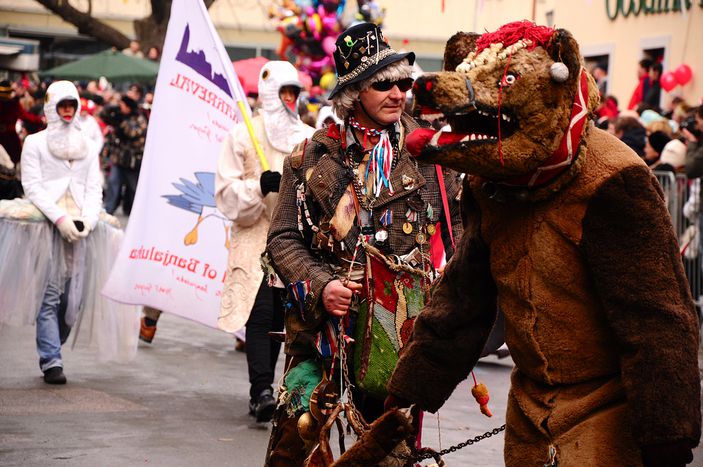
In the country of Slovenians the brown bear is king
Published on
2 million citizens and up to 450 brown bears co-habit the third most forested land in the EU. Slovenia’s Ursos arctos are some of its most protected residents under state and European policies, famous for being unpopularly exported to 'repopulate' the mountains of the French Pyrenees or the Italian Alps. One even made it into the WikiLeaks dispatches, so cafebabel.com had to go into the wild
They are scavengers and omnivores, but the bears of southern Slovenia are prided on being circumspect creatures, afraid of humans. Yet when a five-month-old cub allegedly strayed to a house in Podvrh, Poljanska dolina in north-western Slovenia in April, the Logar family ignored a written order to return the European protected species who they nicknamed Lucky (aka 'Srecko' - sreca means luck and happiness), back to his natural environment. ‘In the first weeks, he sucked milk from local cows on the farm, happily played and slept carefree with other animals on the farm. He even climbed onto the cherry tree and picked cherries,’ Matevz Logar, the head of the family, wrote in an earnest petition for Lucky's return.
Love is in the bear: Slovenian tabloid fodder
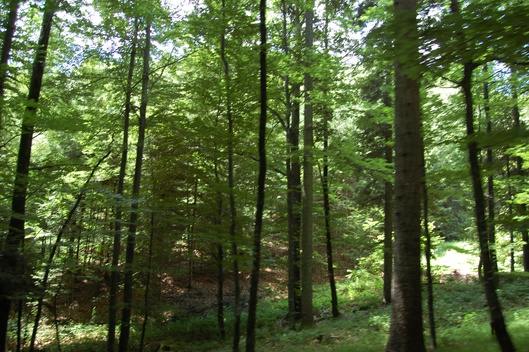 Popular reports say that between five and seven hundred bears live in Slovenia, although Miha Krofel of the biology and forestry deparment at the university of Ljubljana points out that the last genetic study counted 434 bears. In this south-eastern European country two-thirds of the land is forest, making it the third most forested European member state after Finland and Sweden. Slovenians love nature, and are far from the hysteria fomented in the Finnish media of being wary of bears roaming in the wild. 'Bears in Slovenia are a given fact,' underlines philosophy of ecology professor Luka Omladic, echoing recent debates about Slovakia's mountain bears. ‘As predators, they are at the top level of the food chain. A forest without bears is like a forest without pines.' Meanwhile, Slovenia’s capital is hardly under threat of becoming a biotope. One bear who strayed into the capital in 2009 met his master fast. The 'Ljubljancani' (as the 300, 000 residents of Ljubljana are called) mostly shrug off the tale of Lucky the bear and his Grizzly Man-esque protector; they ‘don't watch television’. 'It's not a chihuahua, it can also die,' gnarls Luka.
Popular reports say that between five and seven hundred bears live in Slovenia, although Miha Krofel of the biology and forestry deparment at the university of Ljubljana points out that the last genetic study counted 434 bears. In this south-eastern European country two-thirds of the land is forest, making it the third most forested European member state after Finland and Sweden. Slovenians love nature, and are far from the hysteria fomented in the Finnish media of being wary of bears roaming in the wild. 'Bears in Slovenia are a given fact,' underlines philosophy of ecology professor Luka Omladic, echoing recent debates about Slovakia's mountain bears. ‘As predators, they are at the top level of the food chain. A forest without bears is like a forest without pines.' Meanwhile, Slovenia’s capital is hardly under threat of becoming a biotope. One bear who strayed into the capital in 2009 met his master fast. The 'Ljubljancani' (as the 300, 000 residents of Ljubljana are called) mostly shrug off the tale of Lucky the bear and his Grizzly Man-esque protector; they ‘don't watch television’. 'It's not a chihuahua, it can also die,' gnarls Luka.
The Logar's family’s story of 'domesticating' a bear essentially created a media circus in the end. Born around the new year, cubs come out of hibernation in April weighing around five kilos; they need to gain around 40 within the year to survive, and Srecko was growing big and fast. ‘This country is sometimes so primitive,’ says Nina, 27, who originally comes from the bear region of Kocevje, 65km south of Ljubljana. ‘The police arrested the man for an old traffic fine and put the bear in an animal shelter in Muta (in the north). Stupid.’ Lucky the bear, 2011’s media sweetheart, was eventually extradited to Romania. ‘I'm very sad for nature when people take bears,’ says Miran Bartol. As 'head of section' at the Slovenia forest service ('Zavod za gozdove Slovenije'), he is the middle man between hunters and the environmental authorities for large carnivores. He is sceptical about how the little bear got to Podvrh when the majority are from his area, which includes the towns of Ribnica, Kocevje, Postojna, Loz and Crnomelj. ‘Feeding a bear is the beginning of the end because it becomes dependent,' he adds. Miran calls the Logar petition to lobby prime minister Borut Pahor and environmental minister Roko Zarnic to 'get their teddy bear’ back 'bad marketing' for bears; 'They end up as toys until they are one years old.’
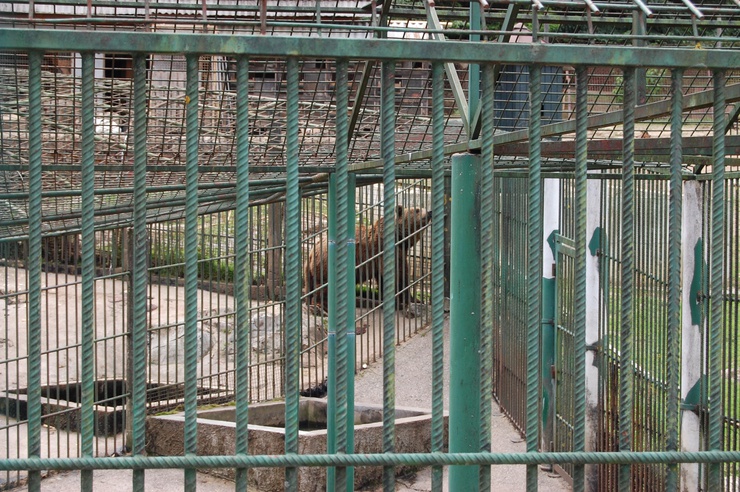
Bears and hunting in Yugoslavia
When Miran first met a bear cub in the forest which he walks every morning at 6am, it was in its most dangerous potential setting – sitting with its mother – at the same distance as we sit across the table from each other at the Tabu bar in the village of Zapotok. 'I felt a fear but it wasn't aggressive. I started to run backwards but I fell onto my back,’ he remembers, holding his keys and gesticulating from behind his tinted glasses in the sun. Miran's job is essentially to 'control the conflict between humans and bears'. If a bear has touched a person or been reported as a nuisance, it will meet its demise under Miran and the law's charge. Back in Ljubljana, Luka Omladic wryly points out that the annual number of deaths at the hands of a bear are equal to mushroom poisoning deaths. 'Slovenia has semi-centralised hunting rules,' he explains. 'Local hunting societies need more bears killed to get money.' He proposes that the system be completely centralised for state officials who only kill to meet the quota.
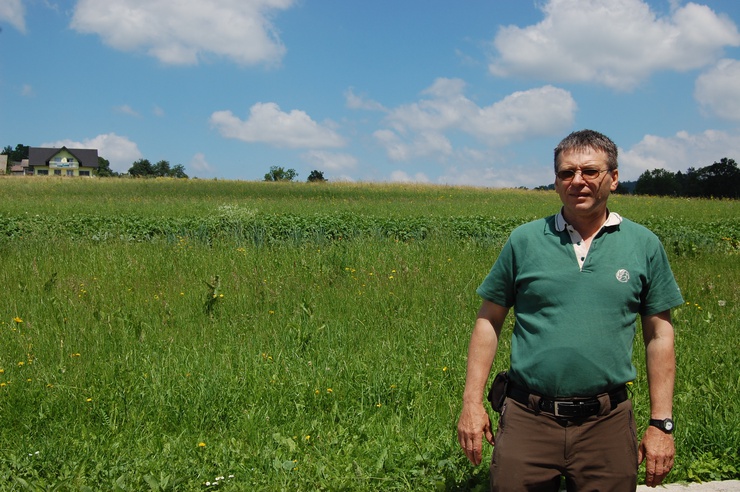
Historically, the bear species was more protected when Slovenia was still a part of Yugoslavia before 1991. For Slovenia to enter the European union as a member state in 2004, enlargement criteria emphasised that member states had to ensure 'favourable conservation status of natural habitat, wild species and flora and fauna'. EU directives have thus seen the bear population enjoy an increase of 100%. Today, Slovenia boasts an official state bear institute and uses and implements neck sensors for thrice-yearly counts as well as hunter licenses. Miran insists that all he feels is respect towards the animals. Once a student activist himself, he now teaches hunting. Of the 20, 000 registered hunters in his region in Slovenia, he estimates that eighty are professionals and around 10% are women. Hunter numbers fluctuated slightly over the years, though they are 'equally experienced' as they are 'trained at the same time'.
Internal bear tourism vs. European bear barbecue
Could ‘bear safari tourism’ boost Slovenian economy? In a country of low salaries (around 1,000 euros net) tourism is on an internal high. From the heart of the virgin bear Mecca in Kocevje, Miran is against the idea. ‘We are proud of our bears, but we don't want mass tourism,' he smiles. The closest to finding a gap in the market is at the Kobola family’s workshop in Kocevje, whose locals are at one with their wild neighbours. In a corner of the downstairs family bathroom, grandfather Kobola’s stuffed one-year-old bear stands in mid-rage on a plaque, an heirloom of the hunting activity reminiscent of the old rural socialist community. Two generations on, the father-son duo of Matija and Emil have evolved from hunting bears to supporting local educational initiatives. They carve bears and other figurines and dishes out of woodwork in a family business which is as old as Slovenia itself, as well as taking schoolchildren on bear guide tours in the surrounding forests as a hobby. 'We don't have problems with them,’ says Emil. ‘The wind blows in yours or their direction so you'll smell each other before you see each other; they usually smell like rotten meat.'
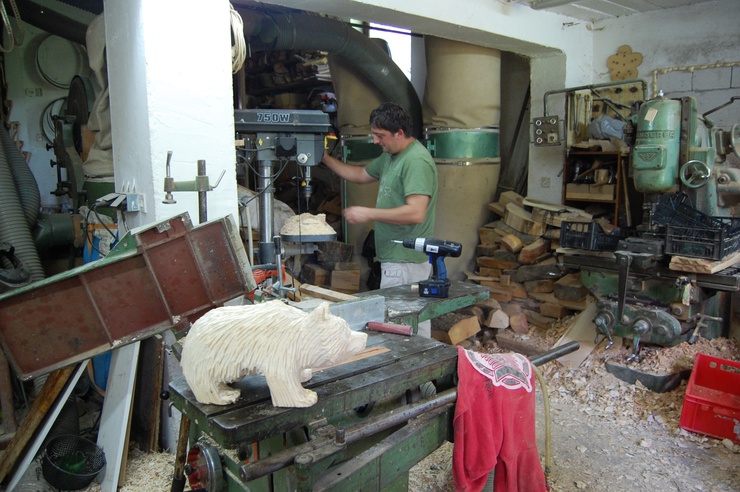
It also smelt of rotten meat in the neighbouring Italian Alps recently, where potential far-right voters were encouraged to barbecue Slovenia’s bears than learn how to live with an endangered species. On 5 July the Northern League party (a coalition partner of Berlusconi) held a ‘bear banquet’ in Trentino. It’s the very place from where Germany’s ‘Bruno the problem bear’, who was subject of a leaked WikiLeaks US diplomatic dispatch in 2010, became the first in 170 years to wander into Bavaria (only to be killed by Finnish hunters over 125, 000 euros later for eating livestock and pets). Police blocked the Trentino ‘protest feast’ at the re-population of brown bears in the Italian Alps as part of the EU’s Life Ursus programme in Austria, Italy and Slovenia. 50 kilos of bear meat legally imported from Slovenia was confiscated under certification queries. What does Miran make of it? 'EU countries killed big beasts and lost their contact and feeling with the animals,' he finishes, as he sets off to get honey from the bees and practice singing in the church choir for a wedding later on in the day. 'We never did. It only became a problem when the animals left.' The US diplomats may have orated via WikiLeaks back home that modern Europeans ‘still need time to relate to untamed nature’, but Slovenia seems to be at peace.
Many thanks to Mojca Finc, Miha Mohoric and Dominik Osvald. Read the official cafebabel.com Ljubljana blog
This article is part of cafebabel.com’s 2010-2011 feature focus on Green Europe; read the full set of city special editions
Images: main (cc) Camera on autopilot/ Flickr/ ekke.si/; all in-text © Nabeelah Shabbir



